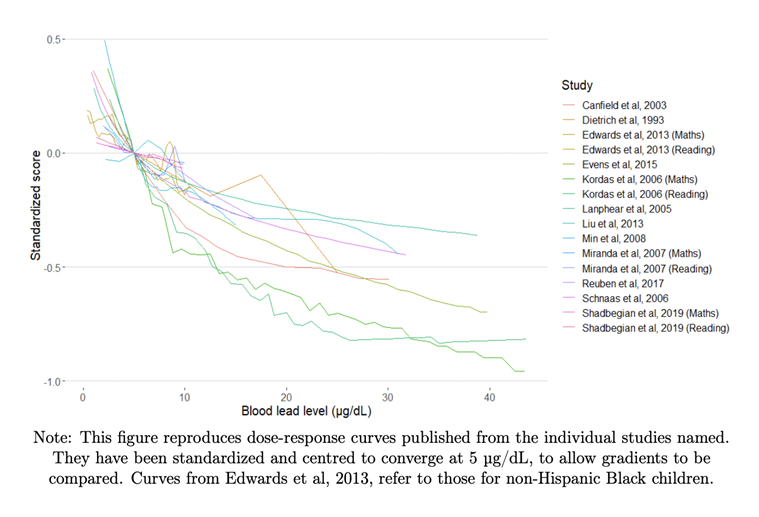Did you know that the United States has its fair share of children with elevated blood lead levels exceeding (>5 mcg/dL) from 100% to an incredibly small percentage as of today?
Indeed, lead is a poisonous element which has impacted the lives of many individuals. It has a directly negative impact on the health of the younger generation.
In fact, there are parts of the world where lead exposure has contributed to long term learning disabilities in children who have grown up to be adults.
How lead affects the learning outcome in the younger generation & what are the common learning disabilities children often have to face with lead poisoning?
In this article, we are going to explore all of it.
The Effect of Lead on Learning Outcome
According to research, it has been found that lead poisoning and its exposure can impact a child’s cognition and observational power. A 47-page-long review was published as the CGD papers, discussing how lead has impacted the lives of children. It highlighted how lead poisoning among children has caused significant learning disabilities within them.
Today, most of the published literature online indicates that prolonged exposure to lead can marginally reduce the IQ levels of children. More than 15 different studies conclude that children are experiencing reading problems and are unable to solve simple mathematical problems. However, a dramatic increase in their performance has been recorded by minimizing lead exposure from their environments

Caption: The dose-response curve between individual blood and test scores
Common Learning Disabilities in Children Due to Lead Exposure
Intellectual Disabilities: Many young children have reported problems with their cognitive functioning. They may develop intellectual disabilities, such as an inability to focus properly on simple problem-solving. In some scenarios, children have also frequently complained about finding it difficult to recall old memories. When tested for IQ levels, their scores were significantly lower, and they also exhibited weak reasoning capabilities.
Attention Deficit Hyperactivity Disorder (ADHD): Young adults who were exposed to lead during their childhood were found to have developed symptoms of ADHD. ADHD results in impulsive behavior and makes it difficult for children to pay attention. In the younger generation, it leads to hyperactivity, which disturbs the ability of younger children to focus on important tasks, thereby causing a range of other problems.
Language and Communication Disorders: It was also observed that young children exposed to lead experienced delays in speech development. They were unable to understand spoken English or had significant difficulty articulating proper words during their speech. They also struggled with reading and writing, which had a significant impact on their academic performance. Additionally, they faced issues with decoding words and comprehending texts.
Behavioral Problems: Children with lead exposure may exhibit behavioral problems, including aggression, impulsivity, irritability, and difficulty regulating emotions. These behavioral issues had an impact on their interactions with peers and authority figures. Furthermore, they faced challenges fitting into society and encountered difficulties socializing with others in the community.
How to Reverse the Effect of Lead Exposure?
Lead exposure can have lasting impact on health, especially among the younger generation. While it’s not entirely possible to reverse the effect of lead exposure, there are certain steps that one can take in order to reduce its impact. These steps may help children recover to a considerable extent.
Prevention: The best approach to minimize lead exposure is to detect and remove lead from the environment. At Manhattan Lead, our lead inspection team will inspect different parts of your home and ensure there are no lead traces remaining within the property. Just in case, if there’s lead within the environment, our team will create a detailed report & send someone over for lead removal.
Medical Treatment: If your child has previously been exposed to lead, it’s best to consult a healthcare professional. They will perform blood tests and measure how much lead is present in your children’s blood. At times, healthcare professionals recommend chelation therapy to remove lead from the child’s body. The process is performed under the governance of trained medical professionals.
Nutritional Changes: To combat lead poisoning, eating a healthy diet makes all the difference. Feeding your child with adequate food containing nutrients such as calcium, iron, and vitamin C can reduce lead absorption from the environment. It can also support cognitive development & increase motor skills.
Concluding Thoughts
Lead exposure can vary from children to children.
There are many factors such as a child’s immunity and development challenges which may depend on how lead poisoning may have impacted their overall health.
If precautionary measures are taken first-hand, you can prevent your child from experiencing long-term learning problems. At Manhattan Lead, we take lead exposure very seriously.
When was the last time you considered getting your house tested for lead? Manhattan Lead can help you make your home lead-free by providing a detailed analysis through a sophisticated lead inspection process in NYC.
Call now at (212) 226-1614 and get lead inspection services today.




